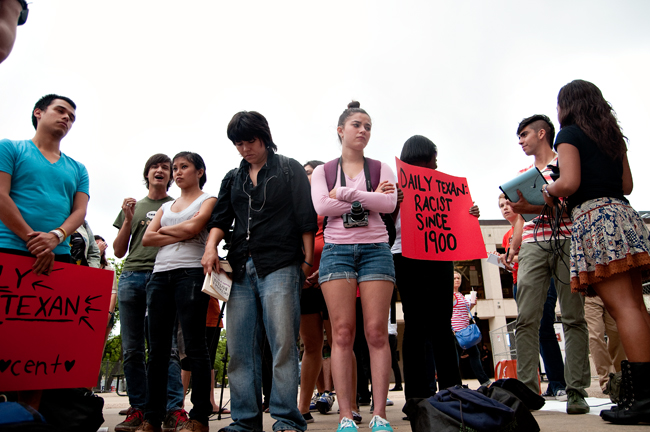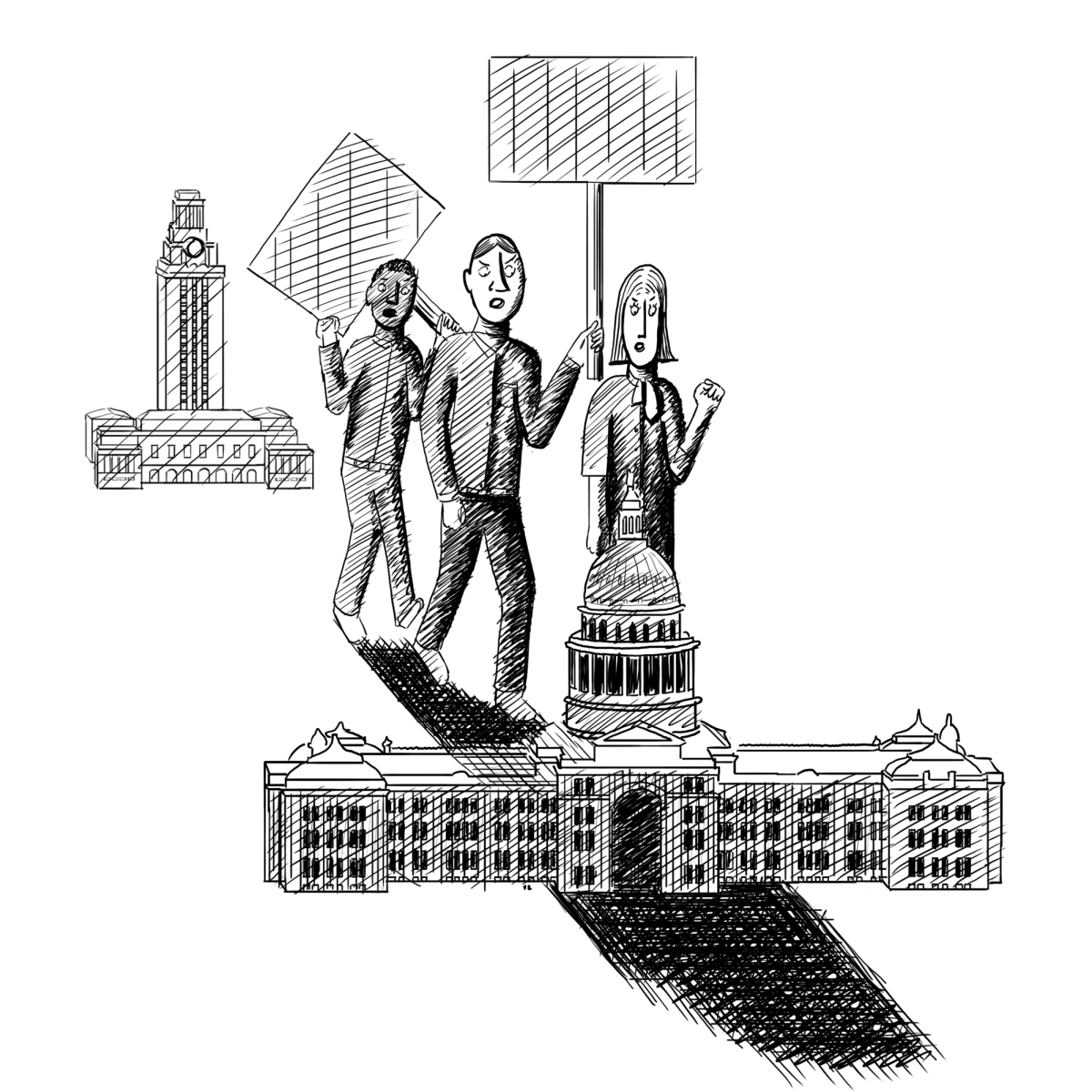The Daily Texan editorial board apologized for a cartoon published in Tuesday’s Daily Texan at a Wednesday protest by students and Austinities who said the illustration reflected ignorance and racism.
The five members of the editorial board signed off on the cartoon before it ran, said Daily Texan editor-in-chief Viviana Aldous, Plan II and philosophy senior. In an official apology published in today’s Texan, Aldous said the board should not have approved the cartoon. Stephanie Eisner, the editorial cartoonist who drew the illustration, is no longer working at The Daily Texan and has apologized in a separate statement.
The cartoon depicts a mother reading to her child the following words: “And then the big bad ‘white’ man killed the handsome, sweet, innocent ‘colored’ boy.” The mother reads from a book entitled “Treyvon (sic) Martin and the case of yellow journalism.”
Many were upset with the use of the word “colored” and timing of the comic, which was released the same day as a large downtown rally for Trayvon, said Black Student Alliance member Jasmine Kyles, journalism junior.
“A lot of people don’t realize how insensitive this comic is, and this affects the recruitment of African-American students to the University by making the campus look bad,” Kyles said. “When they see things like this, they think the University is racist even though that hasn’t been everyone’s experience here.”
Eisner said she created the work to criticize the media’s attempt to simplify and sensationalize news stories.
“Our intent was not to offend anyone, and we are sorry that it happened,” the board said in its apology. “There was clear oversight that happened in allowing this cartoon to be published.”
The usage of the word “colored” also tied the cartoon directly to racist sentiments deeply embedded in U.S. history, said journalism professor Robert Jensen, who teaches a class on media law and ethics.
“Any cartoon that uses an overtly racist term such as ‘colored boy’ expresses a racist sentiment,” Jensen said. “The evidence is clear that in a white-supremacist society, we white people who do not endorse a racist ideology are not free of racist sentiments at an unconscious level.”
Trayvon Martin, a 17 year old African-American, was allegedly shot and killed by neighborhood watch volunteer George Zimmerman while walking through a gated community to his father’s fiance’s home in Sandford, Fla. last month.
Zimmerman has claimed the killing was in self-defense, and because of Florida’s “Stand Your Ground” self-defense law he has not been taken into custody. Following a slow build of awareness through a number of articles published in The New York Times and discussions in online forums, the killing rose to national awareness and clamor has grown for Zimmerman’s arrest.
Occupy UT members Lucian Villasenor and Michelle Uche, who is also a member of the International Socialist Organization at UT, created the protest that began outside The Daily Texan’s office at 1 p.m. on Wednesday. They also drafted a petition to censure the cartoonist who created the illustration, replace the editorial board and open The Daily Texan to commentary and guest editors from the John L. Warfield Center for African and African American Studies to raise awareness about racial issues, Villasenor said.
Daily Texan Managing Editor Audrey White and the editorial board spoke and answered questions from members of the protest.
“We have not done enough to try and explore how racism affects this campus,” White said. “You deserve a paper that reflects the interests of everyone at UT.”
Many members of the protest were unhappy with just a simple apology, such as anthropology graduate student Elvia Mendoza, who said UT needs action about racism and not just discussions about diversity.
“We need to do more than just talk about race and diversity, we need to talk about how racism continues to affect this campus, and that means having more than just forums and meetings,” Mendoza said.
A large number of Daily Texan and UT alumni were also unhappy with the publication of the cartoon, including those who published comments on The Daily Texan website.
Journalism graduate student Tara Haelle, who taught journalism for four years at Sam Houston High School in Arlington, said she was disappointed by the “knee-jerk” reaction of the alumni and believes the board should not have apologized.
“I would expect the alumni to recognize the importance of free speech and not to chastise and patronize the editorial board,” Haelle said. “I don’t happen to agree with the opinion of the cartoonist, but if nothing else, that cartoon encourages a discussion about race.”
Journalism professor Maggie Rodriguez, who teaches a class on Hispanics in the media, said journalists could not use professional practices as a substitute for sensitivity.
She also said that while The Daily Texan was not being intentionally racist, more diversity in the staff was needed.
“By diversity I don’t mean people of the same race, but people who can be anyone and have special sensitivity to ethnicity,” Rodriguez said. “Just filling The Daily Texan with people of different races wouldn’t work, because you can have a person of a special race who is not aware of certain issues in our country.”
Rodriguez said she hopes The Daily Texan is able to grow from the oversight involved in publishing the cartoon.
“I hope people don’t just get fired,” Rodriguez said. “If people can come out of a mistake on race related issues and learn from it, then you can become a huge advocate for looking at race in a more nuanced way.”
In the board’s apology, it offers steps to improve the Texan’s coverage of race and racism, including requiring education about race and media for Texan staff and seeking submissions from a wider range of columnists.
“We understand these are only small steps in the much larger transformation we must undergo,” the board said. “We sincerely apologize for publishing the offensive cartoon and for the harm that decision caused.”
Printed on Thursday, March 29, 2012 as: Protesters: racism still affects campus




















